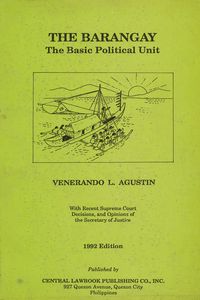- The Barangay
- Venerando L. Agustin
- Publisher: Central Book Supply, Inc.
- ISBN: 971-16-0197-4
- No. of Pages: 144
- Size: 6"x9"
Description:
This book—-Barangay, was actually written more than three decades ago, mentally that is, when the author was an information officer in the defunct Presidential Assistant on Community Development (PACD), forerunner of the present Department of Interior and Local Government (DILG). It was only recently, that he started putting on paper the contents of the book. This book was written as labor of love for the barrio residents whom he had long associated with as a barrio development worker. Way back in 1957, up to 1967, he ate, slept with and thought of nothing but community development. In short he was "married" to community development. He was a ringside spectator and participant of the development of the barrio headed by the barrio teniente, now promoted to barangay captain. When our lawmakers during the time decided to make the positions of the members of the barrio council elective, almost nobody wanted to volunteer as a candidate. This is so because, the position of barrio captain or councilman was a position of honor, bestowed upon and not sought for. During those times, it was a part of delicadeza for the genuine barrio leader not to seek the captainship of the barrio. The honor was offered to him on a silver platter as a recognition of his vast experience, leadership and fair dealing with his barriomates. Because of this consensus of the people to select not elect their leader, seldom did we see during those times, young people occupying the captainship of the barrio. But times have changed, and the problems then were much tamer than the problems we have now. We need not only young but aggressive leaders who are impatient for speedy development and change. The barrio or the barangay as it is now called, has awakened... As the basic political unit of the government, it has its own executive, legislative and conciliation bodies, the latter which is almost a semi-judicial body called correctly or incorrectly barangay court.





